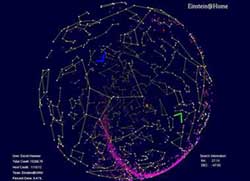

About Einstein@Home
In This Section |
|
The Einstein@Home Project
Einstein revolutionized our understanding of the universe and set the course for physics research in the twentieth century. Now, 50 years after his death and 100 years after his Special Theory of Relativity was published, we have the chance to confirm one of Einstein’s most important predictions. But we need your help – read on to find out why you should get involved.
Einstein suggested that we live in a universe full of gravitational waves. He proposed that exploding stars, colliding black holes and other violent events create waves that alter space and time. We have not detected these waves yet because it requires tools sensitive enough to measure very small effects. It’s like trying to detect a change in the distance from the earth to the sun equal to the width of an atom.
Technology has caught up with Einstein’s prediction. We now have detectors sensitive enough to see these waves. Two of them, the Laser Interferometer Gravitational Wave Observatory (LIGO) in the United States and GEO 600 in Germany, are working together to find gravitational waves from stars and black holes. These experiments require enormous amounts of data to be processed, so the LIGO group created Einstein@Home.
 |
|
| Einstein@Home screensaver |
Bruce Allen from the University of Wisconsin - Milwaukee developed the Einstein@Home project. Einstein@Home is based on SETI@Home, a similar program looking for signs of extraterrestrial life in data from the radio telescope at Arecibo Observatory. We are lucky to have the pioneering developer of SETI@Home, David Anderson, helping with Einstein@Home.



